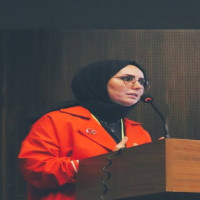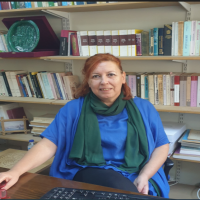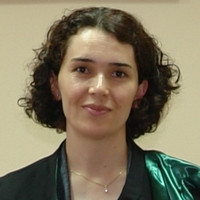Research Article
Book Review
Issue Reviewers























Prof. Dr. Zülfikar BAYRAKTAR
İlk, orta ve lise eğitimini İzmir’de tamamladı. Lisans eğitimini Ege Üniversitesi Edebiyat Fakültesi Türk Dili ve Edebiyatı Bölümü’nde; yüksek lisans ve doktora eğitimini Ege Üniversitesi Türk Dünyası Araştırmaları Enstitüsü’nde Türk Halk Bilimi Anabilim Dalında tamamladı.
Türkmenistan İlimler Akademisi Milli El Yazmaları Enstitüsü'nde, Rusya-Novosibirsk Devlet Üniversitesi Etnografya ve Antropoloji Enstitüsü'nde, Rusya- Saint Petersburg Devlet Üniversitesi'nde, Rusya-Başkurdistan Ufa Devlet Kütüphanesi'nde, Rusya-Tataristan Kazan Devlet Üniversitesi'nde ve Özbekistan-Karakalpakistan Berdak Adındaki Devlet Üniversitesi'nde araştırmalarda bulundu.
Bosna Hersek Zenica Üniversitesi Türkoloji Bölümünde öğretim üyesi olarak görev yaptı.
TİKA başta olmak üzere; (Türk İşbirliği Koordinasyon Ajansı Başkanlığı), T.C. Millî Eğitim Bakanlığı, T.C. Sağlık Bakanlığı, T.C. Çevre, Şehircilik ve İklim Değişikliği Bakanlığı ve T.C. Tarım ve Orman Bakanlığı’nda bürokrat olarak görev yaptı.
Bandırma Onyedi Eylül Üniversitesi’nde Medya ve İletişim Bölümü, Türk Dili Bölümü ve TÖMER birimlerinde Bölüm Başkanlığı ve Müdürlük görevlerini yürüttü.
Anadolu Üniversitesi'nde Kurumsal İletişim Koordinatörlüğü ve Rektör Danışmanlığı görevlerinde bulundu.
Yunus Emre Enstitüsü'nde, Türkçe'nin Sesi Radyosu'nda program koordinatörlüğü görevini yürüttü.
TRT başta olmak üzere; çeşitli televizyon ve radyo kanallarında Sosyal Medya ve Algı Yönetimi, Sosyal Medya ve Ulusal Güvenlik, Kültür Politikaları ve Türk Dünyası Kültür Diplomasisi konularında konuşmacı olarak bulundu.
Türk Dünyası Halkbilim çalışmaları başta olmak üzere; UNESCO Somut Olmayan Kültürel Miras Eğitimi, Sosyal Antropoloji, Kültür Endüstrisi, Kültür Turizmi ve Ekonomisi, Kültür Politikaları, Dijital Kültür, Sivil Toplum Kuruluşları ve Kültürel Entegrasyon, Göç Sosyolojisi, Göç ve Kimlik, Diaspora ve Kimlik, Dil Politikaları, Kültür ve İdeoloji, Kültür Diplomasisi, Sosyal Bilimler ve Yapay Zeka alanlarında birden çok kitap, makale ve bildirisi mevcuttur.
EkoAvrasya Vakfı Mütevelli Heyeti, Türk Dünyası Sivil Toplum İşbirliği Derneği Yönetim Kurulu ve Türk Dünyası Mühendisler ve Mimarlar Birliği üyesidir.
İngilizce ve Rusça bilmektedir.

Ümüt AKAGÜNDÜZ, 1982 yılında doğdu. 2005’te Ankara Üniversitesi Dil ve Tarih-Coğrafya Fakültesi Tarih bölümünden mezun oldu. 2008’de Ankara Üniversitesi Sosyal Bilimler Enstitüsünde “Yeni Ufuklar Dergisi Perspektifinde Türkiye’de Düşünce Hayatı (1952-1965)" adlı çalışmasıyla yüksek lisans eğitimini başarıya ulaştırdı. 2012’de "II. Meşrutiyet Dönemi Düşünce ve Kadın Dergilerinde Kadın Tartışmaları (1908-1918)" adlı çalışmasıyla doktora eğitimini tamamlayan Akagündüz, 2007-2019 yılları arasında Ankara Üniversitesi'nde öğretim elemanı ve üyesi olarak çalıştı. 2018’de "Türkiye Cumhuriyeti Tarihi" alanında doçent unvanını alan Akagündüz, 2021’de Nafi Atuf Kansu Eğitbilim Araştırmaları ödülünü kazandı. Toplumsal tarih, eğitim tarihi, kadın hareketi ve düşünce tarihi üzerine çalışan Akagündüz “II. Meşrutiyet Döneminde Kadın Olmak”, “Mikro Tarihin Gözünden 1924” adlı kitaplarla “Talim ve Terbiye Derslerinde Usul” adlı bir kitap çevirisine sahiptir. Ulusal, Uluslararası dergilerde yayımlanmış pek çok bilimsel makalesi bulunan Akagündüz, halen Ahi Evran Üniversitesi Tarih Bölümünde öğretim üyesidir. Aynı zamanda evli ve bir kız babasıdır.


Aim & Scope
The Journal of Ottoman Civilization Studies [JOCS] presents a scientific inventory of the interaction studies between individuals and societies in the Ottoman State. Its scope is to publish authentic studies about Ottoman Empire societies and cultures written by social scientists related to anthropology, sociology, history, and political sciences. The journal focuses on problems and possibilities, as well as the past and the future. The comparisons between cultures and societies are made as far as possible. Articles must be predicated on authentic research and analysis.
The Journal of Ottoman Civilization Studies [JOCS] was adopted as a principle for publishing in fields related to Ottoman History, Ottoman Civilization, and Ottoman geography.
JOCS organizes or supports in-country or abroad academic conferences, symposiums, workshops, etc. It includes the full versions of the proclamations submitted in these studies only if it is not published elsewhere.
The journal presents a scholarly account of studies of individuals and societies in Ottoman Civilization. Its scope is to publish original research by social scientists in anthropology, sociology, history, political science, and related social sciences about Ottoman Empire societies and cultures and their relationships. The journal focuses on problems, possibilities, and the past and future. Where possible, it compares cultures and societies. Articles should be based on original research and can be co-authored.
Author Guidelines
The articles are only submitted by the open journal system.
Authors should upload their articles to the system after they write or edit their writings according to the journal article template.
*Cases such as name similarities, surname changes, names of Turkish letters, different spellings, and institution changes may create problems in publication/citation searches made by the author's name. Researchers need to obtain their depiction or identity/number (ID). For this reason, all of our writers are required to register for ORCID. It is recommended that our authors should request their ORCID information and include this information in journals/articles since ORCID is going to be used to ensure standardization and in the joint studies that are going to be carried out with YOK.
*ORCID is the abbreviation of Open Researcher and Contributor ID. ORCID is a 16-digit, numbered URI compatible with the ISO Standard (27729), the International Standard Name Identifier (ISNI).
You can create a free registration for an individual ORCID at http://orcid.org.
* Authors should upload their articles to the system after they write or edit their writings according to the journal article template.
The studies sent to the journal are expected to be between 5,000 and 12,000 words. Books and other promotions should be at most 1,500 words.
The editorial board reviews the articles uploaded to the system by the authors and then decides whether to include them in the assessment.
The editors check every article submitted to the Journal of Ottoman Civilization Studies in terms of their resemblance and plagiarism, using similarity programs such as iThenticate, Turnitin, and İntihal. Articles with more than %25 plagiarism are returned to the author without being taken to the assessment process. If the resemblance is not apparent in the articles or other works to the degree of %25 and above, the studies are sent to the two referees who are experts in the field. Regarding the positive report that referees receive, the article is published. In the case of one of the referees' adverse reports, depending on the report's content, if it is seen as necessary by the editor, the article is sent to a third referee. If the third referee's report is positive, the article is published; otherwise, it is not published. If the article is not assessed within the time given to the referee, the article is sent to another referee. A single referee report is deemed satisfactory for book reviews. It is forwarded to a second referee in the event of a need.
Text
1. The journal text should be written in Times New Roman type font, with 12 font size, with a 2,5 cm gap from all of the edges, with only one column, with 1 line gap, and in the size of A4.
2. Paragraphs should start with one indentation; there should be no gap between paragraphs.
3. When stress is needed within the text, it should be done with italics.
4. there should be 6 pt gaps before and after the paragraphs.
5. There should be no information about the author within the text.
6. The studies sent to the journal are expected to be between 5,000 and 12,000 words. The book and other promotions should be at most 1,500 words.
The Article Title
1. The title should clearly define the article's subject, field, and the limits of its problems.
2. The title should be in bold and centered, with the expectation of its conjunctions in uppercase in its first letters and in 12 font size (Times New Roman).
Abstract/Keywords
1. every article should have a Turkish and English abstract at the beginning.
2. The abstract should contain the purpose of the article, its essential findings, and conclusions.
3. The abstract should be justified[150-200 words] and written in a manner that does not exceed 200 words.
4. The abstract and keywords should be written in Times New Roman font type, 10 font size, and with single line spacing.
5. At the bottom of the abstract, there should be a minimum of 3 and a maximum of 5 keywords that describe the article's content.
1. All titles should be written in Times New Roman font style, with 12 font sizes.
2. In the section titles, the first letters of the words should be upper case, while the others should be lower case, with centered and bold letters.
3. In the sub-title section, the first letters of the words should be upper case, while the others should be lower case, with left centered and bold.
4. In the third or fourth-level titles, the first letters of the words should be uppercase, while the others should be lowercase using the paragraph title.
The Display of Table and Figure/Visual
1. Tables and figures should be prepared to be published and used when indicated in the text.
2. Tables and titles should be in Times New- Roman, with 10 font sizes and single spacing.
3. In the title of the tables, the first letter of every word should be upper case.
4. The texts in the table should be single-spaced, with a gap of 0 pt before and after, and written without adding spaces between paragraphs of the same style.
5. There should be no vertical lines in the table.
6. The width of the lines within the table should be measured according to a width of 1 / 2 pt.
7. there should be a 12-point gap before and after the table.
8. In the display of the table's title and the table's number, the table's number should be bold and left center, and the table's title should be the standard and left center. E.g., Table 1.The Information about the Gender of the Participants
9. In displaying the titles of the figures and visuals, the number of the figure/visual should be bold and centered, and the title of the figure/visual should be regular and centered. E.g., Figure 1. Turkey Cities Map
CHICAGO FOOTNOTE-REFERENCE SYSTEM
CHICAGO NOTES AND BIBLIOGRAPHY STYLE
Presidential Ottoman Archive [BOA]
BOA, BEO, 1655/124078; 3549/266169; 4174/313019; 4181/313547.
BOA, DH.EUM.4.Şb, 8/20.
BOA, DH.EUM.KLU, 9/12.
Single-author book:
In footnote:
Erol Köroğlu, Türk Edebiyatı ve Birinci Dünya Savaşı, 1914-1918: PropagandadanMilli Kimlik İnşasına (İstanbul: İletişim Yayınları, 2004), 35.
Surname, Name, Work name. The work's publication place/city: The establishment that published it, Publication date.
In reference:
Köroğlu, Erol. Türk Edebiyatı ve Birinci Dünya Savaşı, 1914-1918: Propagandadan Milli Kimlik İnşasına. İstanbul: İletişim Yayınları, 2004.
In footnote:
İnci Enginün ve Zeynep Kerman, Bütün Eserleri/Ahmet Haşim (İstanbul: Dergah Yayınları,1991), 25-28.
In reference:
Enginün, İnci ve Zeynep Kerman. Bütün Eserleri/Ahmet Haşim. İstanbul: Dergah Yayınları, 1991.
Three Authors Book:
In footnote:
İrfan Dağdelen, Hüseyin Türkmen ve Nergis Ulu, Türk Kütüphaneciliğinden İzdişümler: Nail Bayraktara Armağan (İstanbul: Büyükşehir Belediye Başkanlığı - Kültürel ve Sosyal İşler Daire Başkanlığı - Kütüphane ve Müzeler Müdürlüğü, 2005 ).
In reference:
Dağdelen, İrfan, Hüseyin Türkmen ve Nergis Ulu. Türk Kütüphaneciliğinden İzdişümler: Nail Bayraktara Armağan. İstanbul: Büyükşehir Belediye Başkanlığı, Kültürel ve Sosyal İşler Daire Başkanlığı, Kütüphane ve Müzeler Müdürlüğü, 2005.
Four or More Authors Book:
In reference:
Günay Kut vd., Boğaziçi Üniversitesi Kandilli Rasathanesi ve Deprem Araştırma Enstitüsü Astronomi Astroloji Matematik Yazmaları Kataloğu: Kandilli Rasathanesi El Yazmaları (İstanbul: Boğaziçi Üniversitesi, 2007), 104.
In reference:
Kut, Günay, Hatice Aynur, Cumhure Üçer ve Fatma Büyükkarcı. Boğaziçi Üniversitesi Kandilli Rasathanesi ve Deprem Araştırma Enstitüsü Astronomi Astroloji Matematik Yazmaları Kataloğu: Kandilli Rasathanesi El Yazmaları. İstanbul: Boğaziçi Üniversitesi, 2007.
Book That has a Person That Prepared the Book for the Publication with the Author:
In footnote:
Ahmet Mithat, Ahbar-ı Âsara Tamim- Enzar: (1307-1890) Edebi Eserlere Genel Bir Bakış, haz., Nüket Esen (İstanbul: İletişim Yayınevi, 2003). 46.
In reference:
Ahmet Mithat. Ahbar-ı Âsara Tamim-i Enzar: (1307-1890) Edebi Eserlere Genel BirBakış. Haz., Nüket Esen. İstanbul: İletişim Yayınevi, 2003. (If the author's surname is apparent, it was written before.)
Book That has a Translator with the Author:
In footnote:
Norman Hampson, Aydınlanma Çağı, çev., Jale Parla (İstanbul: Hürriyet Vakfı Yayınları, 1991), 150.
In reference:
Hampson, Norman. Aydınlanma Çağı. Çev., Jale Parla. İstanbul: Hürriyet Vakfı Yayınları, 1991.
If its author or who it was prepared by is not apparent, the name of the person who prepared it or the translator's name is written before the work's name in the footnote or reference part according to its style, and then it is written such as haz.,/Haz., or çev.,/Çev.
In footnote:
Özdemir Nutku, çev., Romeo ve Juliet (İstanbul: Remzi Kitabevi, 1984), 25.
In reference:
Nutku, Özdemir, Çev. Romeo ve Juliet. İstanbul: Remzi Kitabevi, 1984.
A Part From the Book:
In footnote:
Halid Ziya Uşaklıgil, “Bölüm 22,” Aşk-ı Memnu, 8. bs., haz., Muharrem Kaya ve Rahim Tarım (İstanbul: Özgür Yayınları, 2007), 43.
In reference:
Uşaklıgil, Halid Ziya. “Bölüm 22.” Aşk-ı Memnu, 8. bs., Muharrem Kaya ve Rahim Tarım. İstanbul: Özgür Yayınları, 2007.
Printed Article:
In footnote:
Köksal Seyhan, “Yunus Emre’nin Bir Şiirinde Şehir Alegorisi,” Türklük Bilgisi Araştırmaları Journal of Turkish Studies 24/II (2000): 240.
In reference:
Seyhan, Köksal. “Yunus Emre’nin Bir Şiirinde Şehir Alegorisi.” Türklük Bilgisi Araştırmaları Journal of Turkish Studies 24/II (2000): 231 - 280.
Electronic Article:
In footnote:
Nezihe Seyhan, "Resurrection Day in Divan Literature," Literature & Theology: An International Journal of Religion, Theory, and Culture, 18:1 (2004 Mar), 64. (erişim 12.08.2009)
In reference:
Seyhan, Nezihe. "Resurrection Day in Divan Literature." Literature & Theology: An International Journal of Religion, Theory, and Culture. 18:1 (2004 Mar), 62-76. (erişim 12.08.2009)
Encyclopedia Matter:
In footnote:
Osman Eskicioğlu, “Fakir”, TDV İslâm Ansiklopedisi, XII (İstanbul 1995), s. 129.
In reference:
Eskicioğlu, Osman. “Fakir”, TDV İslâm Ansiklopedisi, XII (İstanbul 1995), ss. 129-131.
Web Page:
In footnote:
“Google Gizlilik Politikası,” son güncelleme 19 Ağustos, 2015, https://www.google.com/intl/tr_tr/policies/privacy/.
Google. “Google Gizlilik Politikası”. Son güncelleme 19 Ağustos, 2015. https://www.google.com/intl/tr_tr/policies/privacy/.
In footnote:
“McDonald’s Happy Meal Toy Safety Facts,” McDonald’s Corporation, erişim 19 Temmuz, 2008, http://www.mcdonalds.com/corp/about/factsheets.html.
In reference:
McDonald’s Corporation. “McDonald’s Happy Meal Toy Safety Facts.” Erişim 19 Temmuz, 2008. http://www.mcdonalds.com/corp/about/factsheets.html.
Thesis:
In footnote:
Zeynep Sabuncu, “Mihr ü Mah: A Mathnawi of Mustafa Âli” (yüksek lisans tezi, Boğaziçi Üniversitesi, 1983), 112.
In reference:
Sabuncu, Zeynep. “Mihr ü Mah: A Mathnawi of Mustafa Âli.” Yüksek lisans tezi, Boğaziçi Üniversitesi, 1983.
In footnote:
Mustafa Akdağ ve Hidayet Tok, “Geleneksel Öğretim ile Power Point Destekli Öğretimin Öğrenci Erişisine Etkisi” (XIII. Ulusal Eğitim Bilimleri Kurultayı’ında Sunulan Bildiri, İnönü Üniversitesi Eğitim Fakültesi, Malatya, Temmuz 06-09, 2004).
In reference:
Akdağ, Mustafa ve Hidayet Tok. “Geleneksel Öğretim ile Power Point Destekli Öğretimin Öğrenci Erişisine Etkisi” XIII. Ulusal Eğitim Bilimleri Kurultayı’ında Sunulan Bildiri, İnönü Üniversitesi Eğitim Fakültesi, Malatya, Temmuz 06-09, 2004.
Ethical Principles and Publication Policy
Ethical Principles and Publication Policy
Price Policy
The Journal of Ottoman Civilisation Studies charges a fee at the publication stage under Article 20 of the Interuniversity Board [ÜAK] Associate Professorship Criteria Frequently Asked Questions.
Indexes
Citation Indexes
Other Indexes
Journal Boards
Editor- in -Chief

Section Editors [Medieval History]
Section Editors [New Age History]


Section Editors [Modern Age History]

Section Editors [History of Ottoman Institutions and Civilization]

Section Editors [Ottoman Period Language and Literature]








Section Editors [History of Ottoman Education]
Section Editors[Ottoman Period Architecture and Art]
Editorial Board












Language Editors [English]

Scientific Publication Coordinator

Selim Hilmi Ozkan is Professor of History at the Yildiz Technical University. He is currently working on the Ottoman diplomacy and Ottoman foreign policy. His most recent publications include “Reasons for Migration of Armenians in the Ottoman Empire before 1915”, African and Asian Studies, 19, 3, (2020), 282-305; and “Arms Smuggling across Ottoman Borders in the Second Half of the 19th Century” Journal of Balkan and Near Eastern Studies, 18, 3, (2016), 297-312. He is currently working on a book project: Migrations and Migration Routes from Cebel-i Lebanon to United States of America End of Nineteenth Centuries.
Indexes
SCOPUS, TÜBİTAK/ULAKBİM TR DİZİN [SBVT]
INDEX COPERNİCUS [ICI], ISAM, SOBIAD and Scilit.

Unless otherwise stated, the articles published in our magazine are licensed under the Creative Commons Attribution 4.0 International (CC BY 4.0) license. All authors and translators who submit texts for publication in the journal are expected to be the sole copyright holders of the submitted text or to have obtained the necessary permissions. By submitting texts to the journal, authors and translators implicitly accept that these texts will be licensed under CC BY 4.0 unless explicitly stated otherwise to the editors at the outset.








